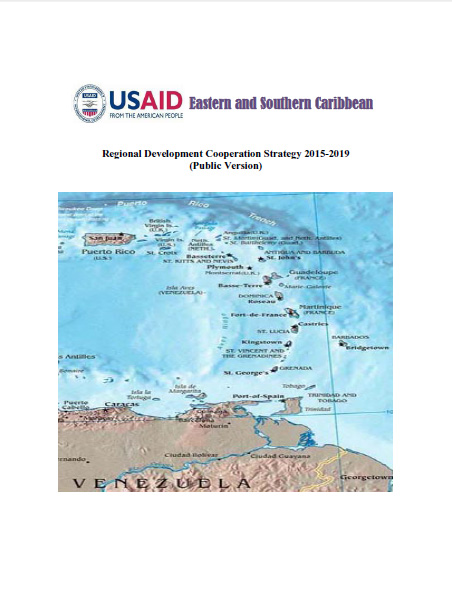USAID’s work in the ESC region directly supports United States foreign policy priorities, fortifying efforts to stem crime and violence and sustain development gains achieved over the past three decades.
ESC - Country Development Cooperation Strategy ![]() (pdf - 1 MB)
(pdf - 1 MB)
The Eastern and Southern Caribbean (ESC) region includes the six independent countries of the Organization of Eastern Caribbean States (OECS: Antigua and Barbuda, Dominica, Grenada, St. Kitts and Nevis, Saint Lucia, and St. Vincent and the Grenadines), Barbados, Trinidad and Tobago, Guyana and Suriname, all of which emerged as independent nations only in the last 50 years. Situated between South America and the United States, the region has become a key conduit for regional trade as well as, more recently, illicit drug en route from South America to North America and Europe.
The ten countries of the ESC region vary in demographic and ethnic composition, and the drivers of economic growth in the two South American countries (mining and agriculture) and in Trinidad and Tobago (energy) differ from those of the six other OECS island states and Barbados (tourism). Yet these ten countries share some of the most severe challenges to their sustainable development. Those common challenges include:
- Crime and security. As counter-drug enforcement and interdiction efforts clamp down on trafficking routes in Central America and Mexico, trafficking in the Caribbean has intensified. With the high unemployment that has resulted from the post-2008 economic recession, the lure of gangs and criminal activity has been strong for many youths, particularly the growing number of males who have underperformed in primary and secondary school.
- HIV/AIDS. The Caribbean has the world’s second-highest regional rate of HIV prevalence, behind only Sub-Saharan Africa.
- Global Climate Change. Increasing weather volatility and storm surges are threatening communities and taking a growing toll on economic infrastructure throughout the Caribbean. In the longer run, rising sea levels pose an enormous challenge, particularly to the seven (7) small island developing states most dependent on beach tourism.
To address these development challenges, the USAID/ESC proposes three development objectives (DOs) and requests the program resources, staff, and operating expense budget required to achieve them:
- DO1: Youth involvement in crime and violence in target communities reduced. The mission will achieve this DO by:
- Increasing regional coordination of crime prevention,
- Increasing the use of alternative justice systems for juvenile offenders, and
- Increasing the ability of youths and their communities to withstand crime and violence.
- DO2: Epidemic control of HIV/AIDS among key populations increased, through:
- Increasing utilization of prevention, care, and treatment services,
- Improving the quality of HIV prevention, care and support services, and
- Improving the enabling environment for the delivery of HIV/AIDS services
- DO3: Negative impacts of climate change on vulnerable populations and natural assets reduced. USAID’s programs will achieve this DO by:
- Strengthening use of climate science and analysis for decision making and
- Reducing the negative impact of climate change on vulnerable populations.
USAID’s work in the ESC region directly supports United States foreign policy priorities, fortifying efforts to stem crime and violence and sustain development gains achieved over the past three decades.
USAID/ESC is prepared to respond to the challenges facing the region through a tailored approach to regional programming that prioritizes resources based on need, host-country commitment, and capacity and enables a limited number of staff to effectively design, monitor, and evaluate activities. USAID/ESC’s work will align with regional priorities and will directly support three presidential initiatives: the Caribbean Basin Security Initiative (CBSI), the President’s Emergency Plan for AIDS Relief (PEPFAR), and the Global Climate Change Initiative.
USAID/ESC will use its platform as a multi-country service provider to promote local actors and regional entities as partners, enhancing their capacity to achieve common goals and support broader foreign policy priorities in the region. The mission will also utilize the capacity of well-established partners to test promising interventions that can be scaled up to a regional level.
USAID/ESC will concentrate resources in the neediest of countries and in those with the host-country commitment and capacity to use our assistance effectively.
Over the five-year planning period, USAID/ESC will request a steady level of program resources from the agency’s CBSI, PEPFAR and GCC accounts.








Comment
Make a general inquiry or suggest an improvement.